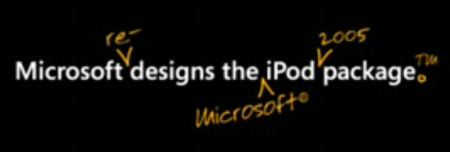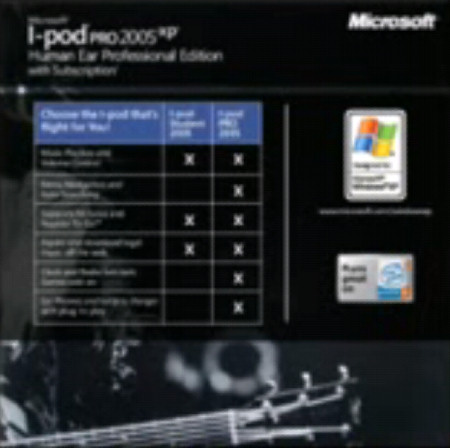[via Scobleizer]
This video is a *MUST*, great and soooo funny :-) As Scob said: ouch.






[via Russell]
Wow, very good perspective from Russell about all the web-2.0-stuff.
The worst thing about all the Web 2.0 hype is the complete loss of business perspective. There’s a few companies out there that seem to get it but just about every other new website I’ve seen lately is nothing but features parading as businesses. Sure, these guys get to be entered in the “Flip It Quick Acquisition Lottery”, but beyond that, none seem to be creating anything of any real value. […]
But let’s think of some of the popular new site launches lately… web chat and IM comes to mind. WTF is the business? All those Map mashups out there? WTF is the business? Calendaring and Ajax desktops? WTF is the business? They’re just FEATURES built on top of other company’s APIs, adding very little real value, and not making a dime of profit. […]
But say you do have something cool, and your new innovation has that 10x improvement that a new service needs to really take off. Not that there’s a lot of this out there, but still. You can create a new website, fill it with all the goodness in the world, be good to your users, and be a good netizen and use every open standard there is while you’re at it, if at the end of the day your users didn’t put money into your bank account, it’s a useless waste of time for everyone involved. I mean, hey, if you want to create the next non-profit service like Wikipedia, all the more power too you. But if you want to get VC cash, an office in downtown Palo Alto, do a bunch of development, attract lots of users and pretend you’re a business? Then act like one, create something of real value and make some real money from it.
I specially like the last proposal from Russell (hey, I am not ironical) :-)
But I really do think there should be a litmus test for new web apps launched from now on – something very basic and if they don’t pass, they don’t qualify for any buzz or linkage. It’s a simple test: Will they take my credit card? That’s it. I don’t care if they have advertisers or sponsors or god knows what else, all I want to see is a place where I can type in my credit card for some service.
Rodrigo is right, it is important to notice that Ingrid Betancourt (Wikipedia, official website) is still held after 4 years, completely crazy.
Can you imagine what 4 years are ? If you were 4 years younger ? If you hadn’t lived your last 4 years as a free human being ? Actually leave everyone else uninformed about your life ?
Ingrid Betancourt was taken hostage over 4 years ago. And so have many more thousands of innocents in the jungles of Columbia. Time to remember them and do something.
[via InfoWorld]
Tim Bray (Wikipedia, Blog) was interviewed by InfoWorld this week. Wow, *very* interesting inputs about Open Source, XML, RSS, and his understanding of the Software-Industry. Worth a read!
Tim Bray is director of Web Technologies at Sun Microsystems, but is perhaps best known as a co-inventor of XML. He also has launched one of the first public Web search engines, Open Text Index, and founded Antarctica Systems, specializing in visualization-based business analytics. Additionally, Bray publishes a blog and co-chairs the IETF AtomPub (Atom Publishing Format and Publishing Protocol) Working Group, which is focused on technologies for editing Web resources such as blogs and wikis.
the different kinds of business models you have around software are not specifically a function of whether it’s open source or closed source. I think even if you wanted to do traditional capital cost software licensing, the kind of thing that Oracle still makes a living on, there’s no reason in principle you couldn’t do that and still have the product [be] open source and anybody could download it and compile themselves. […]
Open source is a good characteristic for software in general to have. It seems like we’re all beginning to agree, and our plans for making money from software do include open source by and large. […]
Q: Can you make money just selling support without taking any money for the software itself?
A: Well, we think so. Yes. Absolutely.
The historical model of trying to make your money by software [rights] to use licensing costs, I really do think that’s going to become increasingly unsustainable. Trying to cause people to pay money for something that is duplicated and the cost is zero, is at some level profoundly unnatural. And another issue that has always bothered me as a person who’s been not just a technologist but a business executive, software licensing tends to produce some profoundly bad accounting. […]
So the question of how you would maximize the revenue for the competitive marketplace is one I don’t think we know the answer to yet. We’re betting that closed source is sufficiently unnatural in the long haul, that open source is the way it’s going to end up.
And so the population of people in the world who actually knew SGML and understood the Web was maybe 12 people. So that was the 12 people that ended up on the working group, and I co-edited the specs. I’m a co-editor of XML 1.0. And we basically took SGML, threw away the 90 percent that nobody ever used, made it a little bit more Web-friendly, addressed things with URLs, and that was XML. […]
Has [XML] exceeded our expectations? Oh, my goodness, yes. We thought we were building something that would enable somewhat more efficient publishing of Web pages to multiple devices and so on, and the explosion of creativity and energy around XML has wildly exceeded anything we could have possibly dreamed.
The world’s most successful XML application right at the moment is RSS. In terms of the volume of data, the number of feeds, and that is a huge source of change, not just on the technology front, but also culturally. The notion that we have a communication commons where anybody can write and there are no gatekeepers.
[via Scott Adams]
A *bit* too late for me, could be useful for you? Pure Dilbert ;-)
- Your potential for senior management will be determined by the three H’s: Hair, Height, and Harvard degree. You need at least two out of three. (Non-Harvard schools will be acceptable if it’s clear that you “could have gone” to Harvard.)
- There’s no such thing as good ideas and bad ideas. There are only your own ideas and other people’s. If you want someone to like your idea, tell him he said it last week and you just remembered.
- Teamwork is what you call it when you trick other people into ignoring their priorities in favor of yours.
- Leadership is a form of evil. No one needs to lead you to do something that is obviously good for you.
- Business success is mostly about waiting for something lucky to happen and then taking credit.
[via BetaNews]
Interesting interview of Gary Schare, Director of IE Product Management, from BetaNews. It is about IE7, RSS, Firefox’s growth.
We really didn’t announce a restart of IE development, we announced an extension of the development to bring the work that we were doing in IE7 for Windows Vista down to Windows XP users. […]
The primary driver behind expanding the reach of IE7 to Windows XP was security. […]
There are a number of new feature areas that were showing up in alternative browsers — ones built on the IE platform like Maxthon and Avant Browser, as well as the alternatives such as Netscape, Firefox and Opera — that people said they would really love to see in addition to better security. […]
At the same time, there are alternative technologies that we’re investing in and bringing out to developers, such as the Windows Presentation Framework and the Windows Communication Framework. We’ll be pushing those quite aggressively in March at the Mix 06 conference. We expect a lot of developers to utilize those rich client platforms for building Web-based applications, but we certainly don’t expect ActiveX to go away in any way, shape or form. […]
In general, competition is a good thing, and we respect the work that the Firefox guys have done. It was interesting to read their assessment on their public blogs when we released IE7, and the respect that they showed for us. […]
We’ve built the first RSS platform that any developer can take advantage of, so when you subscribe to a feed in IE7, that feed data will be available to any application that wants to look at it. This opens up a whole new host of RSS reading applications, as well as applications that in the past would have nothing to do with RSS, but now can take advantage of it because of the platform.
[via U2log.com]
U2 has played some concerts in Brazil for about one week. One crazy example of their success was the second concert in Sao Paulo, which was sold out in 7 hours. The tickets were exclusively sold by telephone, the call-center received more than 600’000 calls within these 7 hours…
And, in Monterrey:
U2 kicked off the fourth leg of their Vertigo tour in the Mexican city of Monterrey yesterday (Feb. 12). 48 hours before the concert, more than 600 fans were sleeping at the gates of the stadium in order to get into the ellipse; 24 hours before the show, there were more than 2,000 fans.
By the way, U2 won for every category they were nominated, again, at the last Grammy Awards Show:
On the top, Steve Lillywhite won a Grammy for Producer Of The Year, Non-Classical category due to his work on How to Dismantle an Atomic Bomb.
[via Jeremy]
Good analysis from Jeremy about the strategy of Oracle.
Trying to put MySQL out of business would be a fairly short-term tactical move. I think Oracle is looking 5 years down the road and seeing what the world looks like as the commoditization of enterprise scale infrastructure software components continues. They’re seeing that they “own” a progressively smaller piece of that pie unless they act soon. The rumors of Oracle eyeing JBoss and others are completely in line with this thinking.
If Oracle can become a one-stop shop for folks building the next generation of big business applications, whether or not they use “traditional” Oracle software, the company manages to stay relevant in the new world–and that includes their lucrative consulting services.
Is this reminiscent of IBM’s approach to Linux circa 2001? It sure is.
Gosh, back from 2 weeks in paradise(s). Incredible holidays :-) The eyes full of beautiful colors and wonderful landscapes. And these *beaches*…
As usual, to extend the holidays-feeling, I will publish some pictures and information to share our experience, step-by-step.
First package now!